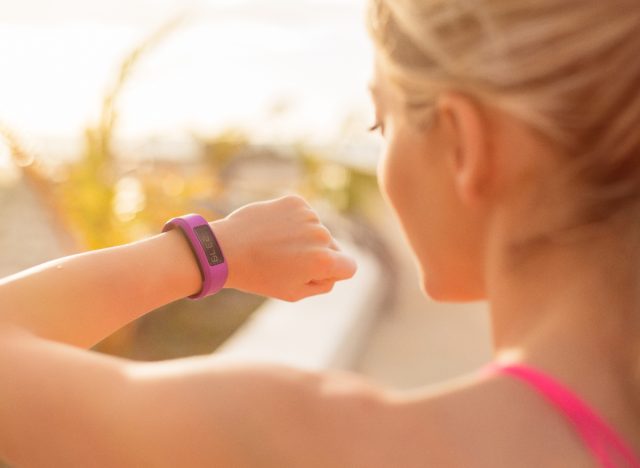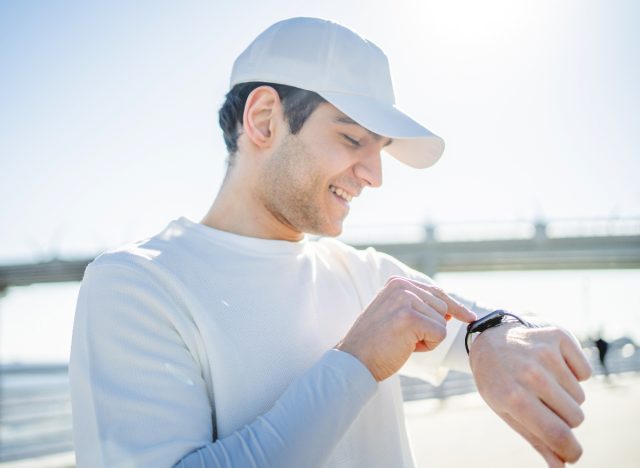Walking is such an amazing and healthy pastime. You can’t afford to not include a brisk walk as part of your routine. Whether you consider it a fun activity to get some much-needed fresh air, your main source of cardio for the day, or some socialization with friends, walking is considered a “weight-bearing exercise,” because you carry your entire body’s weight while you’re getting your cardio in. There’s one key trick to help you walk more each day, and you’ll definitely want to know more about this new best friend. Read on, and next up, don’t miss The 6 Best Exercises for Strong and Toned Arms in 2022, Trainer Says.


First off, walking provides a wealth of benefits to your overall health. According to Better Health Channel, it’s a great way to decrease body fat and build endurance and muscle strength. Taking a productive stride will help improve your balance and strengthen your bones. You’ll also better your heart and lung health, lower your risk of stroke and heart disease, and help manage any conditions like diabetes, high blood pressure, high cholesterol, and muscle or joint pain.
We’re pretty sure we don’t have to convince you further on why it’s an excellent idea to walk each day, but we’d like to share how you can easily get in more healthy steps. Incorporating this super-simple trick into your life will help you walk more each day, so let’s get to it!
Related: This 10-Minute Workout Will Get Rid of Your Belly Overhang, Trainer Says


According to research performed by the University of South Australia, using a wearable activity tracker like a fitness tracker, smartwatch, or pedometer will inspire you to exercise and lose weight by walking as much as 40 minutes more every day. You heard that right! According to ScienceDaily, that extra walking translates to taking about 1,800 additional steps each day, which means losing approximately 2.2 additional pounds over a five-month period. It’s like having an amazing personal coach right by your side pushing you that extra bit you need to tip the scale in a favorable way!
Additionally, researchers found indications that trackers can help in decreasing cholesterol and blood pressure for individuals diagnosed with type 2 diabetes and other health conditions.


University of South Australia scientists evaluated data from approximately 400 various studies which included 164,000 individuals throughout the world who monitor their exercise by wearing a WAT (wearable activity tracker). Their results, which are outlined in Lancet Digital Health, highlight how significantly helpful affordable methods can be to fight the increasing number of chronic health conditions endured by individuals because they aren’t getting enough exercise.
READ RELATED: Scotland wants to pinch English GPs! Nicola Sturgeon's government launches advertising blitz
So many serious diseases can be prevented by exercising, including stroke, type 2 diabetes, cardiovascular disease, mental illness, and some cancers. But some skeptics wonder if these devices encourage eating disorders or obsession. Ty Ferguson, lead researcher UniSA Ph.D. candidate explains, “The overall results from the studies we reviewed shows that wearable activity trackers are effective across all age groups and for long periods of time. They encourage people to exercise on a regular basis, to make it part of their routine and to set goals to lose weight.” Ferguson adds, “The other reported benefit is that WATs improved depression and anxiety through an increase in physical activity.”
Related: 5 Signs of Poor Fitness You Should Never Ignore as You Age, Trainer Says


An extra loss of 2.20 pounds over a five-month period may not seem significant, but from a health and fitness viewpoint, it really is. Carol Maher, UniSA Professor and co-author of the review adds, “Bearing in mind these were not weight loss studies, but lifestyle physical activity studies, so we wouldn’t expect dramatic weight loss. The average person gains about 0.5 kg a year in weight creep so losing 1kg over five months is significant, especially when you consider that two thirds of Australians are overweight or obese.”
The tracking devices are becoming overwhelmingly popular. In fact, from 2014 to 2020, the purchase of them skyrocketed by about 1,500%, which translates to the world spending $2.8 billion dollars on them in 2020 alone.
Okay, those of us who don’t have fitness trackers are signing onto Amazon right now. Are you with us? Hey, every little bit helps—and this trick that’ll help you walk more each day is certainly a foolproof one!
Alexa Mellardo
Source:










